An apprenticeship test (or pre-apprenticeship test) is designed to assess candidates applying for an apprenticeship in one of the labor unions across the U.S. and Canada. Common examples are the IBEW Test (electricians), the EIAT (elevator mechanics), and the Sheet Metal Apprenticeship Test.
Choose Your Apprenticeship Test:
Some employers in the private and public sectors also use pre-apprenticeship screening tests for their apprenticeship programs, the most notable of which is the Amazon RME Apprenticeship Test.
This guide will provide updated and accurate information and pre-apprenticeship practice questions.
Free Pre-Apprenticeship Screening Tests Practice

If you are looking for a different test, or are not sure which test is relevant for your position, please contact us, and we will do our best to ensure you get the most accurate preparation for your upcoming assessment.
Pre-Apprenticeship Practice Test Questions
Apprenticeships combine classroom instruction with paid on-the-job training.
They provide workers with a skills-based education that prepares them for good-paying jobs. A highly-skilled workforce can be recruited, built, and retained through apprenticeship programs.
The following are apprentice aptitude test examples and include apprenticeship test questions and answers.
Electrician Apprentice Practice Test Question (IBEW)
A significant portion of the Electrical Apprenticeship Test (IBEW) consists of advanced reading comprehension and math questions. Here is a free IBEW example question you can try.
Algebra - Polynomials Sample Question
Method A
Remember that:

Simplify and reduce if possible:
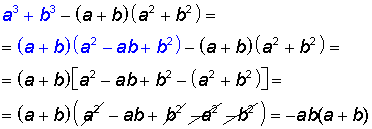
Method B
If you do not remember the formula of sum of cubes, you can open the parentheses and simplify:
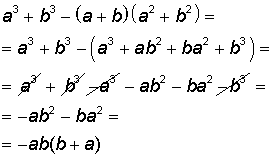
The correct answer is A.
If you chose any other answer, review the solution and the use of formulas.
💡 To learn more detailed information about the exam and find more electrical apprenticeship test questions and answers, go to our free IBEW practice page or check out the IBEW Aptitude Test - prep guide page.
Elevator Industry Aptitude Test (EIAT) Practice Question
There are three sections in the EIAT test - Math, Verbal Reasoning, and Mechanical Aptitude. Here is a free Elevator Industry Aptitude Test example question you can try.
Elevator Mechanical Cogwheel Sample Question
In which direction does the woman have to turn the handle so that the cylinder will rotate in the direction shown in the diagram below?
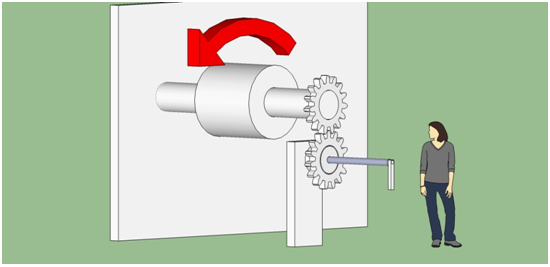
According to the diagram, the woman wishes to turn the cylinder in a counter clockwise direction. We can see that one cogwheel connects with the same axis of rotation as the cylinder; therefore, it will turn in the same direction as the cylinder.
In order for the upper cogwheel to turn in a counter clockwise direction, the lower cogwheel must turn in a clockwise direction. Since the lower cogwheel is attached to the handle that the woman has to turn, she must therefore turn it in a clockwise direction.
The correct answer is B.
💡 To learn more detailed information about the test and practice more EIAT apprenticeship test questions and answers, go to our free EIAT sample test or read the Elevator Industry Aptitude Test (EIAT) guide.
Free Pipefitter Apprentice Exam Practice Question
The Pipefitter test contains four basic topics: Reading Comprehension, Figure Visualization (Spatial Reasoning), Mechanical Ability, and Math. Here is a free Pipefitter Aptitude example question you can try.
Pipefitter Spatial Reasoning Mirror Images Sample Question
Choose the shape that mirrors that shape below:

The correct shape is:

💡 To learn more detailed information about the test and how to prepare for it, go to our Pipefitter Apprentice Exam page.
Carpentry Pre-Apprenticeship Practice Test Question
The Carpenter Apprenticeship test includes Arithmetic Computations and Reasoning, Applied Mathematics and Science, Mechanical Comprehension, Spatial Reasoning, and Reading Comprehension. Here is a free Carpenter Apprenticeship example question you can try.
Carpenter Reading Comprehension Sample Question
Although Britain would not use African troops in Europe, as this would "undermine the dignity of the white man", to Britain’s horror and disapproval, France used some 160,000 Africans from its west African colonies in Europe, with another 65,000 used elsewhere. Britain used some 50,000 African troops and about one million ‘carriers’ in the African campaigns and some 1,000 were used in Mesopotamia. The death rates were high: in the east African campaigns, over 11,000 African soldiers and around 100,000 carriers died; some 22,000 were wounded and/or missing-in-action.
As opposed to Britain, where did France use African soldiers?
According to the passage, "Although Britain would not use African troops in Europe… France sent some 160,000 Africans from its West African colonies to Europe" – so Britain did not employ African troops in Europe, while France did. The passage also states that Britain did use African soldiers in Africa and Mesopotamia, so answers (B) and (C) are incorrect. As for answer (D), India is not mentioned in the passage at all.
The correct answer is A.
💡 To learn more detailed information about the test and how to prepare for it, go to our Carpenter Apprenticeship Test page.
Ironworker Apprentice Exam Practice Question
As part of the Ironworker Apprentice exam, candidates must demonstrate basic math Skills, Advanced Math Skills (number Series, Algebra, Word Problems, and Geometry), and Reading Comprehension Skills. Here is a free Ironworker Apprentice example question you can try.
Ironworker Geometry Sample Question
Please choose the correct answer. If none of the options is the correct answer please choose answer choice e, "N".
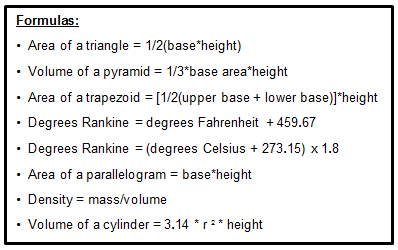
If Antimony melts at 1,625.67 degrees Rankine, at what Celsius temperature will it melt?
The formula for calculating degrees Rankine is:
Degrees Rankine = (degrees Celsius + 273.15) x 1.8
Isolate the 'Celsius degrees' in the formula:
1. Divide both sides of the equation by 1.8
Degrees Rankine/1.8 = (degrees Celsius + 273.15) x 1.8/1.8
Degrees Rankine/1.8 = degrees Celsius + 273.15
2. Subtract 273.15 from both sides of the equation:
(Degrees Rankine/1.8) - 273.15 = degrees Celsius + 273.15 - 273.15
(Degrees Rankine/1.8) - 273.15 = degrees Celsius
Degrees Celsius = (Degrees Rankine/1.8) - 273.15
Insert the given data:
Antimony's melting point = 1,625.67 degrees Rankine.
Degrees Celsius = (1,625.67/1.8) - 273.15 = 903.15 - 273.15 = 630
Solving tip: When dividing two decimals might be easier to turn them into integers by multiplying both the nominator and denominator by a shared multiplication of 10 (i.e. 10, 100, 1000 etc.), e.g.:
100*1,625.67/100*1.8
162,567/180
Use long division:
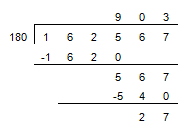
=> 903 + a remainder of 27 = 903 + 27/180 = 903 + 3/20
In order to convert the fraction 3/20 into a decimal we can manipulate the fraction to our advantage, using familiar fractions.
The first, easiest possibility is expanding the fraction, turning it to a fraction of a 10's denominator (i.e. 10,100,1,000 etc.). In this case, multiply both the nominator and denominator of 3/20 by 5:
5*3/5*20 = 15/100 = 0.15
903 + 3/20 = 903 + 0.15 = 903.15
A second possibility is manipulating a fraction, by using fractions whose decimal equivalents are well known and are easy to use e.g.: 1/2 (0.5), 1/4 (0.25) etc.
3/20 = (1*3)/(2*10) = (1/2)*(3/10) = 0.5*0.3 = 0.15
903 + 3/20 = 903 + 0.15 = 903.15
Now, we can return to our formula and compute the final answer:
Degrees Celsius = 903.15 - 273.15 = 630
The correct answer is C.
💡 To get more detailed information about the Ironworker Apprentice aptitude test and how to prepare for it, go to our Ironworker Apprentice aptitude test free guide.
Millwright Apprentice Exam Example Question
The Millwright Apprentice exam varies depending on where you live, but it covers Math, Verbal Reasoning, Mechanical Aptitude, and Spatial Reasoning. Here is a free Millwright Apprentice example question you can try.
Millwright Tools - Identification and Usage Sample Question
The following tool is an example of a:
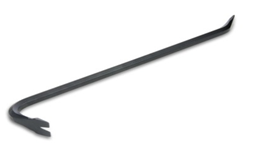
The tool presented in this image is a crowbar. A crowbar provides leverage for separating close-fitting objects, for example – opening crates and extracting nails. It is an example of a first class lever: the crowbar's fulcrum allows its operator to apply force in order to separate adjacent objects. A seesaw and a boat's paddle are also good examples of first class lever.
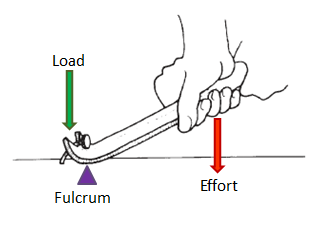
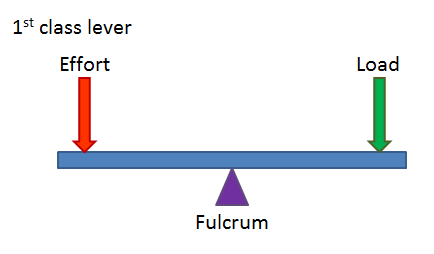
The correct answer is A.
💡 To learn more detailed information about the test and how to prepare for it, go to our Millwright Apprentice Exam page.
Sheet Metal Apprenticeship Practice Test Question
The Sheet Metal Apprenticeship consists of four sections: Math, Spatial Aptitude, Mechanical Aptitude, and Abstract Reasoning. Here is a free Sheet Metal Apprentice example question you can try.
Sheet Metal Spatial Reasoning Sample Question
Choose the figure that matches the following net.
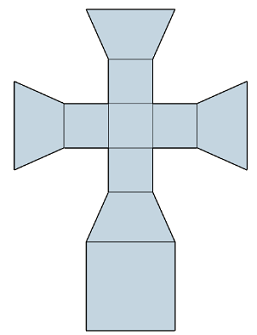
The only figure that consists of five identical squares, as in the given net, is answer (A).
Alternatively, you can disqualify answers (B), (C), and (D) as they have eight trapeziums, unlike the given net. Answer (E) is formed by rectangles, which also do not appear in the given net.
The correct answer is A.
💡 To learn more detailed information about the test and find more sheet metal apprenticeship test questions and answers, go to our Sheet Metal Apprentice exam guide.
Heavy Equipment Operator Sample Question
The Heavy Equipment Operator test measures a candidate's Mechanical Reasoning, Reading Comprehension, and Mathematic skills. Here is a free Heavy Equipment Operator example question you can try.
Heavy Equipment Mechanical Sample Question
Danny received a bunch of colorful helium balloons for his birthday. One of the balloons was not attached properly and flew away.
Assuming the temperature remains constant, what will be the volume of the balloon at a very high altitude?
In order to answer this question one should know the Ideal Gas Law:
PV=nRT
where P =pressure, V = volume, n = number of moles of gas (amount of gas), R = Gas constant, T = temperature.
Since we know the temperature is constant, the right side of the equation will also be constant (providing the amount of gas in the balloon remains constant, meaning: PV = Const, at all times.
As the balloon raises atmospheric pressure decreases since the amount of air above it the balloon is reduced (similar to hydrostatic pressure).
If the pressure decreases (as the balloon raises) then the volume must increase in order for P*V to remain constant.
The correct answer is B.
💡 To learn more detailed information about the test and how to prepare for it, go to our Heavy Equipment Operator Apprenticeship exam guide.
Boilermaker Apprenticeship Exam Practice Question
There are many mathematics concepts and functions covered in the boilermaker apprentice tests, including Measurement; Metric/imperial Conversion; Algebra; Volume; Geometric Objects, Including Perimeter, Area, Angles, Parallel Lines, Sides, Circumference, Diameter, Radius; Fundamental Arithmetic Calculation; Equations; Inequalities; Numerical and Spatial Reasoning; Percentages; and Graphing.
Here is a free Boilermaker Apprenticeship example question you can try.
Boilermaker Math Word Problem Sample Question
A client brings a check for $563.04. He wants to deposit $326 into his checking account, get $40 in cash and deposit the rest into a savings account. How much will he deposit into this savings account?
First, let's calculate how much money the client wants in his checking account and in cash:
Checking+cash= 326+40 = 366.
Now, we subtract this number from the total amount of money – the sum of the check:
563.04-366 = 197.04.
Alternative explanation: If we only subtract $326 (the deposit) from $563.04 (the check/total), we get $237.04 – even before subtracting the amount of cash, we can eliminate answers C and D, as they are too much. Next we would subtract $40 from $237.04, but notice that since 40 is a larger number than 37, we know that the result will be smaller than 200, and so we can also eliminate answer choice B and choose answer A, the correct answer.
The correct answer is A.
💡 To learn more detailed information about the test and how to prepare for it, go to our Boilermaker Apprentice exam page.
Plumber Apprentice Exam Example Question
There are six topics covered in the Plumber Apprentice exam: Reading, Numerical Computation, Numerical Reasoning, Folding, Problem Solving, and Mechanical Comprehension. Here is a free Plumber Apprentice example question you can try.
Plumber Apprentice Numerical Computation Sample Question
Calculate: 4186 : 0.001
The decimal point can move an equal number of spaces in each side of the quotient
4186 : 0.001
= 41860 : 0.01
= 418600 : 0.1
= 4186000 : 1
= 4186000
The correct answer is A.
💡 To learn more detailed information about the test and how to prepare for it, go to our Plumber Apprentice Exam page.
Welder Apprentice Exam Sample Question
The Welder apprenticeship practice tests cover Basic Arithmetic, High School Algebra, Geometry, Number Series, Math Word Problems, Percentages, Averages, Decimals, Fractions, Ratios, Conversions, and Exponents. Here is a free Welder Apprentice example question you can try.
Welder Apprenticeship Number Series Sample Question
The numbers in the figures below have the same mathematical relationship to one another.

What number should replace the question mark in the figure below?

All the circles below exhibit the same numerical relationship - they share the following pattern:
(left-cell) - (right-cell) = 4;
Left circle: 4 (top-left) – 0 (top-right) = 4; 5 (bottom-left) – 1 (bottom-right) = 4
Middle circle: 8 (Top left) - 4 (top right) = 4; 6 (bottom left) - 2 (bottom right) = 4
Right circle: 2 (Top left) - (-2) (top right) = 2 + 2 = 4; 0 (bottom left) - (-4) (bottom right) = 0 + 4 = 4
*Notice! Two minuses cancel each other, and turn into a plus sign:
- (- number) = + number
The circle in question: 6 (Top left) - 2 (top right) = 4; 2 (bottom left) - ? (bottom right) = 4
2 - ? = 4 //Gather all numbers on one side and the ? sign on the other side
-? = 4 - 2
-? = 2 //Eliminate the minus sign from the (?) sign, (since you are asked for the value of ?), by multiplying both sides of the equation by (-1)
(-1)*(-?) = (-1)*2
? = -2
The correct answer is B.
💡 To learn more detailed information about the test and how to prepare for it, go to our Welder Apprentice exam page.
Didn't Find the Preparation You Need? Try Our General Prep
Looking to ace your apprenticeship test and stand out from the competition? Look no further than our general apprentice preparation page!
Even if none of the specific preparations mentioned above match the apprenticeship you're applying for, our comprehensive program covers all the essential sub-sections of every apprentice test, including Reading Comprehension, Numerical, Spatial, and Mechanical Reasoning.
By pressing the get started now button, you'll gain access to a wealth of information and resources
that will help you excel on your test day.
Apprenticeship Assessment Tips
- Research the field you are interested in before you apply for it.
- Make sure you meet the requirements with relevant skills and experience.
- Prepare prior to the screening process.
- Keep cool during interviews.
- Sell yourself, don’t worry too much about what they think.
- Feel free to ask any questions.
Apprenticeship Assessment FAQ
Apprentices are usually young people between the ages of 17 and 25 but they can be of any age.
Apprenticeships take between one and four years.
Apprentices are usually entitled to a minimum rate per hour.
To check for more options visit the National Apprenticeship website.
Taking a labor union aptitude test is one of the requirements of participating in a union apprenticeship program.
Here are some examples of such programs:
- NYC District Council of Carpenters.
- Electrical Workers Local 3.
- Plumbers Local 1.
- Structural Iron Workers & Riggers Locals 40/361.
- Sheet Metal Workers Local 28.
You can find more information in the following link.
Related Links

If you are looking for a different test, or are not sure which test is relevant for your position, please contact us, and we will do our best to ensure you get the most accurate preparation for your upcoming assessment.



